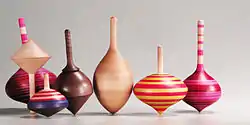独楽
Japanese

Etymology 1
| Kanji in this term | |
|---|---|
| 独 | 楽 |
| Grade: 5 | Grade: 2 |
| irregular | |
| Alternative spelling |
|---|
| 獨樂 (kyūjitai) |
Appears to be a shortening of older reading komatsukuri[1] or komatsuburi[1][2] (see below).
The shorter form koma is now the most common reading. The kanji spelling is an example of jukujikun (熟字訓).
Pronunciation
- (Irregular reading)
- (Tokyo) こま [kóꜜmà] (Atamadaka – [1])[2]
- IPA(key): [ko̞ma̠]
Noun
独楽 • (koma) (kyūjitai 獨樂)
- a spinning top
- (by extension) a rigid object that can rotate freely around a fixed point
- a 家紋 (kamon, “family crest”) in the form or shape of a spinning top
- a hexagonal or octagonal top, decorated with images and/or writing, used for gambling
- Synonym: 御花独楽 (ohanagoma)
Derived terms
- 独楽塗, 独楽塗り (komanuri)
- 独楽鼠 (komanezumi)
- 独楽回し (koma-mawashi)
- 唸り独楽 (unarigoma)
- 曲独楽 (kyokugoma)
- 源水独楽 (Gensui-goma)
- ごんごん独楽 (gongon-goma)
- 杯独楽 (sakazuki-goma)
- 銭独楽 (zenigoma)
- 叩き独楽 (tatakigoma)
- 唐独楽 (tōgoma)
- 貝独楽, 海蠃独楽 (baigoma), 貝独楽 (beigoma)
- 花独楽 (hanagoma)
- 不精独楽, 無精独楽 (bushō-goma)
Etymology 2
| Kanji in this term | |
|---|---|
| 独 | 楽 |
| Grade: 5 | Grade: 2 |
| irregular | |
| Alternative spelling |
|---|
| 獨樂 (kyūjitai) |
Older form of koma above.
Compound of 高麗 (Koma, “Goryeo; China; foreign lands”) + つぶり (tsuburi, “round thing”, cognate with 円ら (tsubura), “round”).[1][2]
Pronunciation
- (Irregular reading)
- IPA(key): [ko̞ma̠t͡sɨᵝbɯ̟ᵝɾʲi]
Noun
独楽 • (komatsuburi) (kyūjitai 獨樂)
- (archaic, possibly obsolete) Same as こま (koma) above
Etymology 3
| Kanji in this term | |
|---|---|
| 独 | 楽 |
| Grade: 5 | Grade: 2 |
| irregular | |
| Alternative spelling |
|---|
| 獨樂 (kyūjitai) |
Additional older form of koma above, attested in the Wamyō Ruijushō (938 CE).
Compound of 高麗 (Koma, “Goryeo; China; foreign lands”) + 作り (tsukuri, “making; made thing”, the 連用形 (ren'yōkei, “stem or continuative form”) of the verb 作る (tsukuru, “to make”)).[1]
Pronunciation
- (Irregular reading)
- IPA(key): [ko̞ma̠t͡sɨᵝkɯ̟ᵝɾʲi]
Noun
独楽 • (komatsukuri) (kyūjitai 獨樂)
- (archaic, possibly obsolete) Same as こま (koma) above
Etymology 4
| Kanji in this term | |
|---|---|
| 独 | 楽 |
| Grade: 5 | Grade: 2 |
| irregular | |
| Alternative spelling |
|---|
| 獨樂 (kyūjitai) |
Ancient alternative to koma above. Probably from 紡錘 (tsumu, “a spindle”, root of the verb 紡む (tsumugu), “to spin thread or yarn”) + 繰り (kuri, “winding”, the 連用形 (ren'yōkei, “stem or continuative form”) of the verb 繰る (kuru, “to wind something onto something else”)).[2][3]
Occasionally also encountered with rendaku as tsumuguri.
Pronunciation
- (Irregular reading)
- IPA(key): [t͡sɨᵝmɯ̟ᵝkɯ̟ᵝɾʲi]
Noun
独楽 • (tsumukuri) (kyūjitai 獨樂)
- (archaic, possibly obsolete) Same as こま (koma) above
Etymology 5
| Kanji in this term | |
|---|---|
| 独 | 楽 |
| どく Grade: 5 | らく Grade: 2 |
| goon | |
| Alternative spelling |
|---|
| 獨樂 (kyūjitai) |
From Middle Chinese 獨樂 (MC duk̚ lɑk̚).
Pronunciation
- On’yomi: Goon
- (Tokyo) どくらく [dòkúrákú] (Heiban – [0])[2]
- IPA(key): [do̞kɯ̟ᵝɾa̠kɯ̟ᵝ]
Adjective
独楽 • (dokuraku) (kyūjitai 獨樂)
- fun or entertaining for one person alone
Usage notes
Used attributively with the particle の (no).
Noun
独楽 • (dokuraku) (kyūjitai 獨樂)
- something fun or entertaining for one person alone
- (uncommon) Same as こま (koma) above
References
- 1988, 国語大辞典(新装版) (Kokugo Dai Jiten, Revised Edition) (in Japanese), Tōkyō: Shogakukan
- 2006, 大辞林 (Daijirin), Third Edition (in Japanese), Tōkyō: Sanseidō, →ISBN
- 1995, 大辞泉 (Daijisen) (in Japanese), Tōkyō: Shogakukan, →ISBN